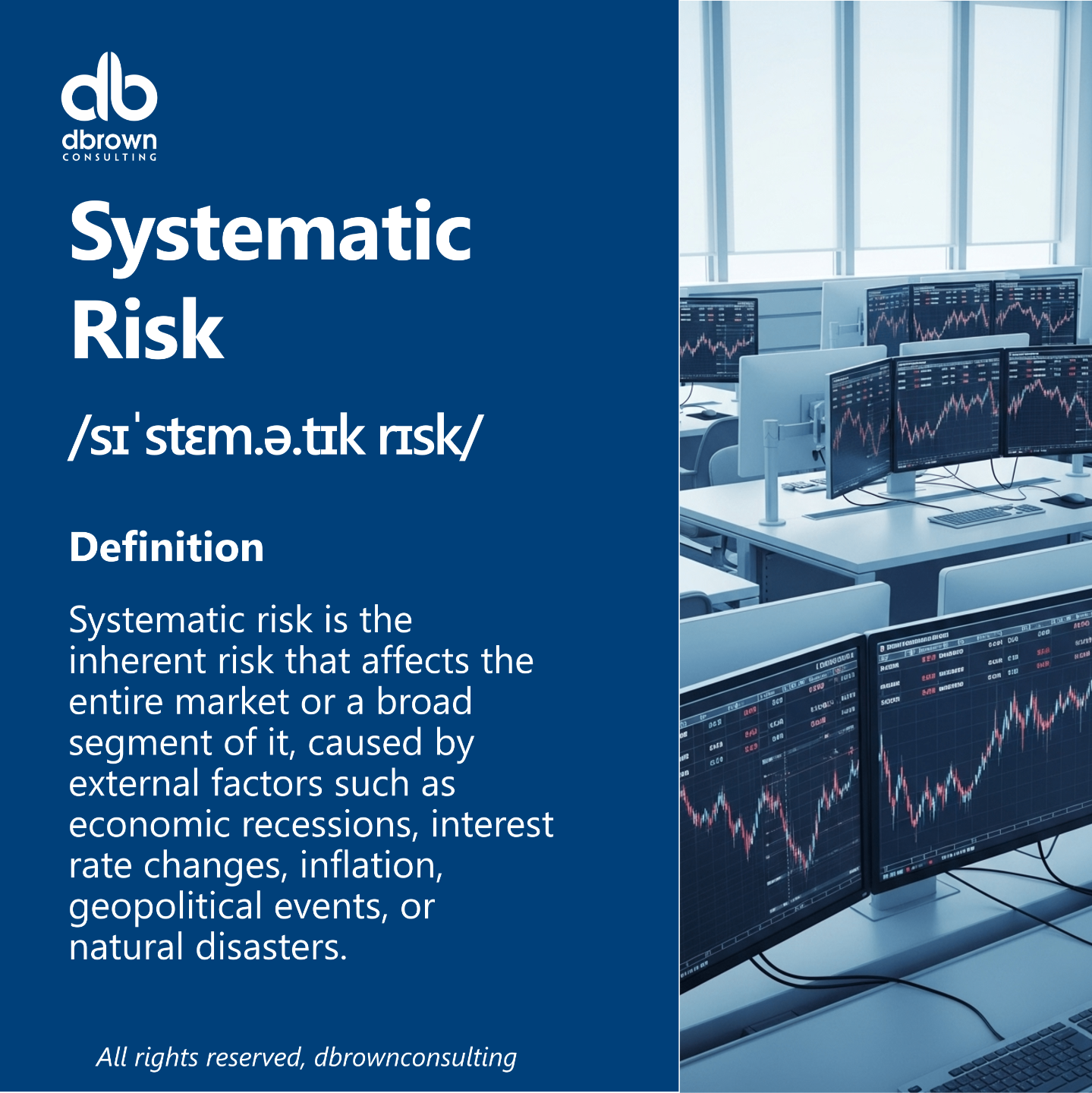SYSTEMATIC RISK
Definition
Systematic risk also known as market risk, is the portion of total investment risk that arises from factors affecting the entire market or economy, rather than individual companies or industries.
It is non-diversifiable, meaning it cannot be eliminated through diversification, though it can be hedged with strategies like derivatives.
Origins
-
From the Greek systema (“organized whole”), referring to risks that affect the entire financial system.
-
The concept became central with the development of Modern Portfolio Theory (MPT) in the 1950s and Capital Asset Pricing Model (CAPM) in the 1960s, which quantify systematic risk via beta (β).

Usage
-
Portfolio Management – Estimating how much of risk is market-driven vs. firm-specific.
-
Asset Pricing – CAPM incorporates systematic risk into expected return.
-
Risk Management – Stress testing portfolios against systemic shocks.
-
Macro Investing – Managing exposure to interest rates, inflation, and geopolitical events.
How Systematic Risk Works
-
Macro factors arise – Inflation, interest rates, recessions, political instability.
-
Market-wide effect – These factors affect most assets in the economy.
-
Investor exposure – Even diversified portfolios are affected.
-
Compensation through returns – Investors demand a risk premium for bearing systematic risk.
Types of Systematic Risk
-
Market Risk – Equity price fluctuations.
-
Interest Rate Risk – Sensitivity to bond yields and borrowing costs.
-
Inflation Risk – Erodes real investment returns.
-
Currency Risk – FX fluctuations affect international investments.
-
Political/Geopolitical Risk – Wars, sanctions, regulatory changes.
Key Takeaway
-
Non-diversifiable: Cannot be eliminated through diversification.
-
Driven by macroeconomic factors (inflation, GDP growth, political risk).
-
Captured in CAPM & asset pricing models.
-
Investors earn a risk premium for bearing it.

Context in Financial Modeling
-
Cost of Equity – CAPM adjusts required return for systematic risk.
-
Portfolio Optimization – Balances β exposures.
-
Stress Testing – Models recession or inflationary shocks.
-
Valuations – Systematic risk determines appropriate discount rates.
Nuances & Complexities
-
Globalization – Cross-border contagion makes systematic risk harder to isolate.
-
Changing betas – β is not static; firms’ exposures shift over time.
-
Hedging limitations – Derivatives can mitigate but not remove systemic shocks.
-
Systemic vs. systematic risk – Related but distinct; systemic refers to collapse of entire financial system.
Mathematical Formulas
In CAPM:
Where:
-
= Expected return of asset
-
= Risk-free rate
-
= Expected market return
-
= Measure of asset’s sensitivity to systematic risk
Beta (β):
-
β > 1 → Asset more volatile than market
-
β < 1 → Asset less volatile than market
Master Financial Modeling with the FMA
Change your career today by earning a Globally Recognized Accreditation
Develop real-world financial modeling skills, gain industry-recognized expertise, stand out and start earning more by gaining the Advanced Financial Modeler (AFM) designation from the Financial Modeling Institute.
Our expert-led online cohort based program covers everything you need to become a world class financial modeling pro and advance your career in finance.
Related Terms
-
Unsystematic Risk (Idiosyncratic Risk)
-
Beta (β)
-
Capital Asset Pricing Model (CAPM)
-
Market Risk
-
Systemic Risk
Real-World Applications
2008 Global Financial Crisis – Systematic risk across all asset classes due to banking collapse.
COVID-19 Pandemic (2020) – Sharp equity declines as economies shut down.
Interest Rate Hikes (2022–2023) – Bond and equity markets broadly affected by Federal Reserve tightening.
References & Sources
Unlock the Language of Finance!
Elevate your financial acumen with DBrown Consulting’s exclusive newsletter. We break down complex finance terms into clear, actionable insights—empowering you to make smarter decisions in today’s markets.
Subscribe Today & Make Financial Jargon Simple!
We won't send spam. Unsubscribe at any time.

